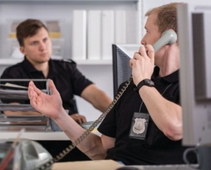
Features
Holding the Line
Opinion
Have you checked in on your sisters and brothers who are away from the job recently?
It happens in every service in a variety of ways; our brothers and sisters sometimes end up in circumstances that take them away from the family in blue.
December 21, 2018 By Michelle Vincent

Perhaps it is a wellness issue – be it physical or mental. Or it may be a workplace incident investigation, either internal or external. The member may even be at work, but away from their usual circle of colleagues, after being transferred to a different unit. Whatever the situation, I’m calling attention to the times when we are separated from those who know us second to our family.
Initially we tend to be very attentive, checking in with a phone call, text or maybe even dropping by. As time goes by and our world fills up with life’s tasks, we slowly drift away, which can present the following challenges:
• the risk of isolation
• negative thoughts and perceptions of those we once thought would support us through anything
• the potential to develop or exacerbate already existing mental health issues, such as depression and anxiety, which can sometimes be masked with addictions
Making the time to check in with our people, whether it be through a text, email or – even better – in person, is a solid message that this person has not been forgotten. It shows that someone truly cares. This is just as crucial an action later on, when the dust has settled in the event. This can be especially true for members who have been off on long-term disability from an illness as well as those off on suspension.
Some of “the forgotten” members who may be away for disciplinary reasons may compound the sensitivity (and perhaps hesitation) of those who want to reach out. Many of us may not even be aware the member has left the organization unless they are part of our own unit.
Furthermore, when we are inspired to connect with them, this does not mean we will be received with appreciative, open arms. We may be on the receiving end of strong emotions felt by the member and if we are not able to depersonalize what our brother or sister has to share with us, then maybe remind someone else on the platoon or in the unit who can depersonalize to check in.
Other resources that support a connecting piece for the member to the policing organization and its family are our Peer Support Units. Despite being inundated on so many levels, they do their very best to check in on members who are away – regardless of the circumstances.
Members of the law enforcement organization’s association can check in, too. However, there are implications they have to consider, as they decide whether reaching out will be constituted as supportive or not. Current supervisors (and past ones) are another valuable source in the check in experience.
One of the most resounding comments made by those away from the job is the lack of a sense of connection with their policing organization when they need it most… whether they are aware of it at the time or not.
Whether we reach out ourselves or send a message to those who may provide a better connection, let’s talk about this “checking in” as a necessity and not assume it is being done, as the likelihood is it is not. Let’s voice the need to check in on our brothers and sisters, understanding we may be met with resentment, but doing it anyways.
Taking the time to show we care by just offering to go for a coffee and having a face-to-face with someone who may be feeling very disconnected and forgotten can save a life.
Let’s send the message no one in our organizations, whether visible on a day-to-day basis or not, is forgotten.
Michelle Vincent is a 17-year York Regional Police officer with a master of arts in counselling psychology and a background in equine-assisted therapy, workplace reintegration after a critical incident and long-term leave, as well as teaching. She is in the process of implementing the first non-profit treatment centre that will be occupationally specific for first responders and is working towards her PhD in Forensic Psychology/Crisis Response. She can be contacted at: michelle@smith.net.
Print this page